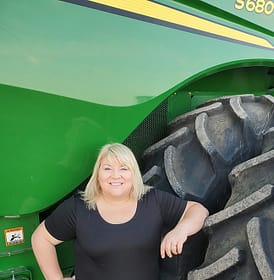Fifth-Generation Farmer’s Mission to Promote Mental Health is Deeply Personal

If you’re a consumer of ag media, then you may have heard the name Liz Hulsizer. She’s a devoted advocate for mental health awareness and accessibility in rural America.
An ADM grain origination specialist and a fifth-generation farmer, Liz and her husband Matt have made it their purpose to get people in rural America talking about mental health, so others don’t have to go through what they experienced.
Liz’s father-in-law, David Hulsizer, took his own life a decade ago. At the time, Liz and Matt were newlyweds and had recently joined his parents to help run the farm. Since then, they have been open about Matt’s father’s suicide with anyone who wants to talk. Sharing their story and feelings helps them heal, and their hope is their experience can help other families.
For more than five years, Liz has been publicly speaking to groups about mental health, telling her story and fostering conversations. She’s been featured in podcasts, newspapers, magazines, and most recently a documentary. Liz recently shared her thoughts with us on this important topic for Mental Health Awareness Month.
What is it about farming that makes it an especially stressful occupation?
It is a beautiful life to live and work on the farm. Watching the fruits of your labor through the growing season is always a joy. However, it’s easy to be constantly consumed with the farm. And all your profits are based on the crop you planted or the livestock you raise. One bad storm or sickness can turn a good year into a bad one. No matter how much you try to control what happens, so much is still at the mercy of Mother Nature or outside news events.
The weight of the farm also can be a heavy burden to bear. Financially, physically, and emotionally it can take a toll. Most family farms are multi-generational, which is something to be proud of, but the weight of that lineage can be burdensome. We planted my family’s 145th crop this past year. When times get tough, when financially it becomes worrisome, you think to yourself – how can I be the one to lose it all? My family made it through the Great Depression, wars, interest rates of the 1980s and much more. It can be hard to realize that, yes, while they had their struggles or burdens too, what we go through is also difficult – just in a different way.
How should rural communities address mental health ailments?
There is a stigma surrounding mental health. It is up to all of us – farmers, neighbors, input dealers, grain buyers and others – to push for acceptability and accessibility for mental health. We show up as a community to help those in need for physical ailments, and we need to do the same for mental ailments. Also, we all need to push for more accessibility in rural America for having the proper resources to get help, such as high-speed internet for rural areas where telehealth options might be difficult to access from the farmstead.
For those struggling with their mental health, where can they turn for support?
It is always best to reach out to a qualified support person who can help you work through your thoughts. But if you don’t feel comfortable doing that, then reach out to a minister, church group, trusted friend or neighbor. You will soon find you are not alone in your struggles, and someone else you are close to has been there before.
Be up front and honest with your doctor that you are struggling. We find it so easy to take an aspirin for a headache or put a cast on a broken arm, but we find it difficult to address our mental health. Taking medication to help with your mental health should be no more of an issue than it is for your physical health.
What advice do you have for farmers and their approach to the profession and lifestyle?
At the end of the day, there is no farm without the farmer. Take care of yourself first before you take care of the farm. While the farm may define what you do, it does not define who you are.
Strive toward a healthy balance between the on-farm and off-farm. The farm is a beautiful place to live and work but it can be all consuming. Having hobbies, organizations or activities that take your mind away from the farm is crucial to a healthy mindset. Granted, this is something easier said than done as I, myself, struggle to find the right balance.
Mental Health Assistance and Resources
To help address mental health issues on the farm, Liz recommends The Farm Family Resource Initiative. They know the struggles of farming and are there to help through telehealth sessions with Southern Illinois University counselors. They can be reached at 1-833-327-6767, and you can receive up to six individual, couple, or group sessions at no cost. The service is private and anonymous, and it is done over the phone, even from the privacy of your tractor cab or vehicle.
For resources specific to farm stress in your state, look here:
ADM is providing this communication for informational purposes, and it is not a solicitation or offer to purchase or sell commodities. The sources for the information in this communication are believed to be reliable, but ADM does not warrant the accuracy of the information. The information in this communication is subject to change without notice. If applicable, any information and/or recommendations in this communication do not take into account any particular individual’s or company’s objectives or needs, which should be considered before engaging in any commodity transactions based on these recommendations. ADM or its affiliates may hold or take positions for their own accounts that are different from the positions recommended in this communication.
